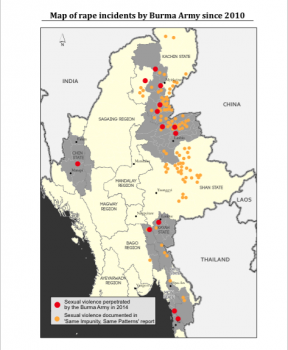Burma’s armed forces are using systematic sexual violence on a “widespread scale,” a report by a women’s group advocating on ethnic women’s rights in Burma has found.
The report, by the Women’s League of Burma, an umbrella organisation that represents 13 organisations, accused the Burmese military of using rape as a strategy of war.
 In a statement released today to coincide with International Day for the Elimination of Violence against Women, the WLB said that it had documented 118 incidences of gang-rape, attempted sexual assault and rape since 2010, in both areas with ceasefire agreements in place and areas of current conflict.
In a statement released today to coincide with International Day for the Elimination of Violence against Women, the WLB said that it had documented 118 incidences of gang-rape, attempted sexual assault and rape since 2010, in both areas with ceasefire agreements in place and areas of current conflict.
“This number is believed to be a fraction of the actual number of cases that have taken place. These abuses—which are widespread and systematic—must be investigated, and may constitute war crimes and crimes against humanity under international criminal law,” the WLB statement said.
The report found that the perpetrators of sexual violence, who were exclusively members of the Myanmar armed forces and police, had “de facto immunity,” and were not brought to trial.
The report comes as President U Thein Sein’s, nominally civilian government, seeks to improve its international credentials, including signing the National Strategic Plan for the Advancement of Women and the Declaration of Commitment to End Sexual Violence in Conflict, moves much lauded at the time.
WLB said that in spite of these agreements, little had been done to guarantee the rights and safety of women from sexual violence. “Few steps have been taken to improve the lives of women in ethnic communities. The absence of concrete and time-bound plans of action has meant that amidst Burma’s ‘transition’ the country’s women continue to be denied their basic human rights,” WLB said.
Tin Tin Nyo, General Secretary of the WLB, said that claims of reform by Thein Sein’s government were utterly discredited while the military continued to engage in sexual violence in ethnic areas.
“The government of Burma has worked hard to show its reformist credentials to the world, but for women in Burma’s ethnic communities, human rights abuses and sexual violence at the hands of the Burma Army remain a constant threat,” Tin Tin Nyo, said, “Any positive changes coming out of Naypyidaw have not improved the lived experience of women in Burma.”
The vast majority of cases occurred in ethnic areas, notably Shan State and Kachin State, areas of ongoing armed conflict.
Tin Tin Nyo said that the military had to be brought under civilian control.
“There must be a negotiated settlement to the civil war that will grant ethnic peoples equality under a genuine federal system of government. If these actions are not taken, state-sponsored sexual violence against women of ethnic communities will not stop,” Tin Tin Nyo said.



